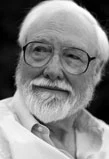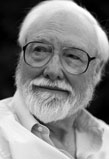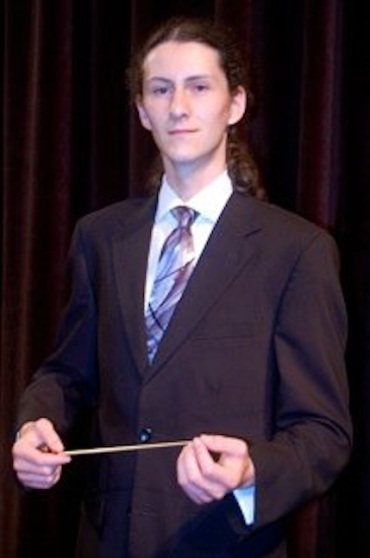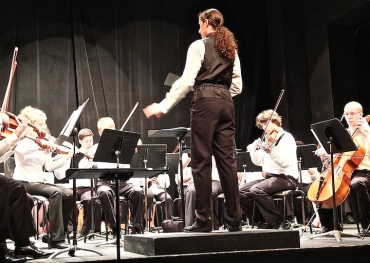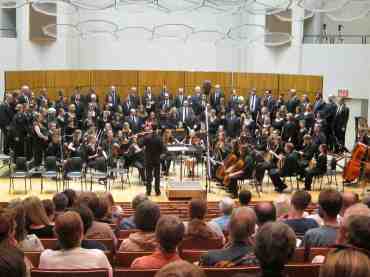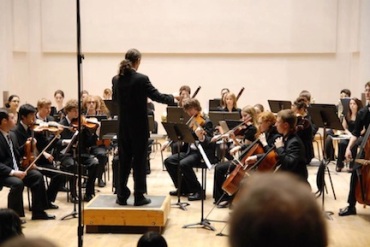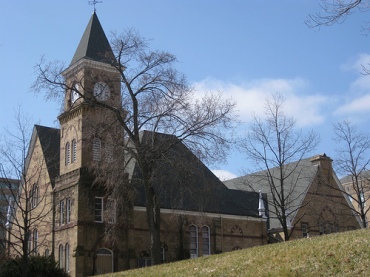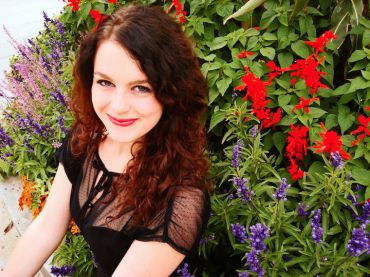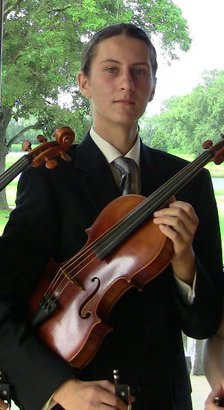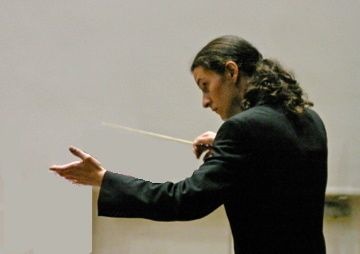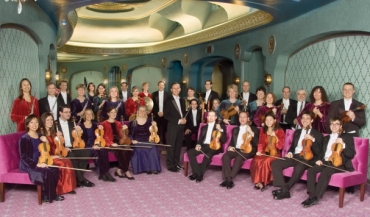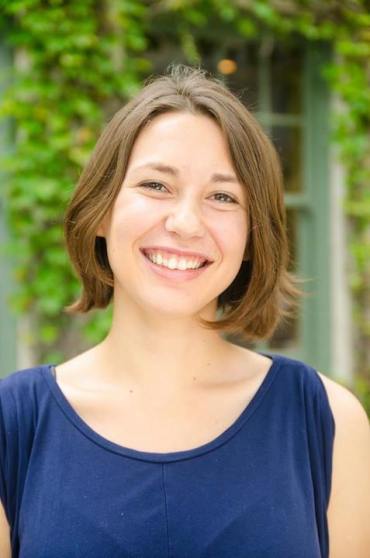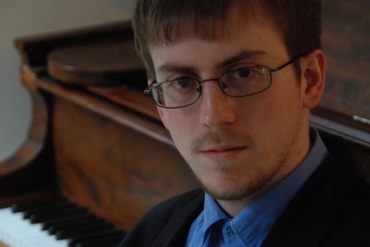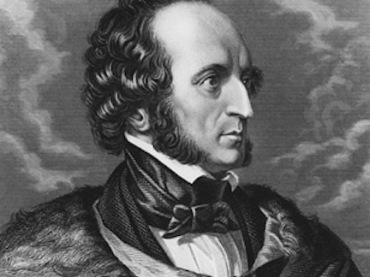The Well-Tempered Ear
Classical music: The talented new director of the Isthmus Vocal Ensemble sets the acclaimed and still impressive group on a new path with mixed results and hopeful expectations
6 Comments
By Jacob Stockinger
Here is a special posting, a review written by frequent guest critic and writer for this blog, John W. Barker. Barker (below) is an emeritus professor of Medieval history at the University of Wisconsin-Madison. He also is a well-known classical music critic who writes for Isthmus and the American Record Guide, and who hosts an early music show once a month on Sunday morning on WORT-FM 89.9 FM. For years, he served on the Board of Advisors for the Madison Early Music Festival and frequently gives pre-concert lectures in Madison. He also took the performance photos.
By John W. Barker
The Isthmus Vocal Ensemble (IVE, below) is a well-established part of Madison’s musical summers. It offers dedicated choral singers a chance for intensive rehearsal preparation of highly accomplished choral music, and has delivered some truly memorable events over the years.
Of its concerts this year, I caught the second performance on Sunday afternoon. The choir itself doesn’t need to be shown off by now, but it was the choir’s chance to show off its new conductor in his first appearance here.
Michael McGaghie (below) is that new conductor. He is very plainly a brilliant choral technician who knows how to make a choir sound wonderful. (For more about McGaghie, who is the Director of Choral Activities at Macalester Collge in St. Paul and who leads the Harvard Glee Club Alumni Chorus in Cambridge, Mass., go to: https://www.isthmusvocalensemble.org/artisticdirector/)
That he did throughout the program. The IVE — 69 singers strong — certainly responded with an infectious enthusiasm that was also communicated to the large audience that filled the Christ Presbyterian Church. The concert was certainly a feast of great choral singing.
But what about the music?
To begin with, the actual music amounted to no more than about an hour’s worth. McGaghie planned the program as a progress of emotional moods, and he introduced each piece himself.
But what were the contents? McGaghie largely turned his back on the centuries of great choral music, the kind that his predecessor Scott MacPherson explored so ambitiously.
There were, at the beginning, two examples of that, motets by Thomas Tallis of the 16th century and Heinrich Schütz of the 17th century.
There was also an interesting nugget from the Russian composer and conductor Nikolai Golovanov (below), an early work of his (1917), setting the Lord’s Prayer (Otche naš) In a style departing from the previous two centuries of great Russian Orthodox choral writing.
Beyond those, however, the remaining nine items in the program — and the encore — were entirely by recent composers, mostly living and mostly American. These were his introductory calling cards, and so they invite scrutiny.
Ours is not an age of great, idiomatic choral writing, and composers go their own ways variously. Many of them rely upon a kind of chordal declamation with little sense of line or full-bodied texture.
Some pieces I don’t think I would want to hear again, and a couple I would not have wanted to hear even the first time.
An example of the latter is a piece about sirens and sailors by Chinese-American Chen Yi (below top), a collage of weird choral sounds but no musical content recognizable to any but Chinese ears.
Another was a loudly trashy adaptation of a Civil Rights “freedom song” by Jeffrey Douma (below bottom), plus the gesture to multicultural triviality in a Philippine folksong arrangement.
Three of the items came with piano accompaniment. In The Whole Sea in Motion by Dale Trumbore (below top) — which uses a text from Anne Brontë — the piano gave an underlying ripple to support declamatory, non-linear writing.
In Eternity by Donald Martino (below), the pleasantly lyrical choral writing really didn’t need the piano at all. And that part was much too prominent against Morten Lauridsen’s nicely polyphonic, and quite self-sufficient, choral texture in “Sure on This Shining Night” that treated James Agee’s famous poem. (You can hear the Lauridsen work in the YouTube video at the bottom.)
There were certainly some among these contemporary items that I found quite enjoyable.
In Ophelia, a setting the account of that woman’s death in Hamlet, Jocelyn Hagen (below top) was overly concerned with story-telling, but the work certainly contained some lovely writing. O Radiant Dawn by Scottish master James MacMillan (below bottom) was a beautifully sonorous tribute to Catholic liturgical tradition.
What does this conducting debut point to for the future?
McGaghie can create the most splendid choral beauty — though often at the sacrifice of clear diction. On the basis of this program, it looks like he could now focus the IVE on lots of short contemporary pieces, rather than on the vast traditional literature.
We will have to see.
Tags: #Americancomposers, #AmericanRecordGuide, #AnneBrontë, #BlogPost, #BlogPosting, #CambridgeMassachusetts, #ChenYi, #ChoralMusic, #ChristianChurch, #ChristianReligion, #ChristPresbyterianChurch, #CivilRights, #DaleTrumbore, #DonaldMartino, #EmeritusProfessor, #GleeClub, #HarvardUniversity, #HeinrichSchütz, #IsthmusNewspaper, #IsthmusVocalEnsemble, #JamesAgee, #JamesMacMillan, #JeffreyDouma, #JesusChrist, #JocelynHagen, #JohnW.Barker, #Lord'sPrayer, #MacalesterCollege, #MadisonEarlyMusicFestival, #MedievalHistory, #MichaelMcGaghie, #MortenLauridsen, #MusicCritic, #NikolaiGolovanov, #PianoAccompaniment, #PolyphonicMusic, #RomanCatholicism, #RussianComposer, #ScottMacPherson, #St.PaulMinnesota, #ThomasTallis, #UniversityofWisconsin, #UniversityofWisconsin-Madison, #WilliamShakespeare, #WORT-FM89.9, 16th century, 17th century, accompaniment, alumni, American Record Guide, Anne Brontë, arrangement, Arts, Baroque, beauty, brilliant, Chen Yi, Chinese, Chinese-American, Choir, choral, choral music, chordal, Christ, Christ Presbyterian Church, church, civil rights, Classical music, classicalmusic, collage, composer, Concert, conductor, Dale Trumbore, declamation, director, Donald Martino, Early music, earlymusic, emeritus, emotion, emotional, enthusiasm, event, famous, feast, folk song, folksong, gesture, Glee Club, Hamlet, Harvard, Heinrich Schütz, History, infectious, Isthmus, Isthmus Vocal Ensemble, Jacob Stockinger, James Agee, James MacMillan, Jesus, Jesus Christ, Jocelyn Hagen, John W. Barker, lecture, liturgical, Lord, Lord's Prayer, Madison, Madison Early Music Festival, Medieval, MEMF, memorable, Michael McGaghie, Morten Lauridsen, motet, multicultural, Music, Nikolai Golovanov, Ophelia, Philippine, photo, Piano, piece, plan, poem, Poetry, polyphonic, polyphony, prayer, Presbyterian, professor, program, recent, rehearsal, Roman Catholicism, Russian, Scotland, Scott MacPherson, Scottish, sea, Shakespeare, singer, Singing, St. Paul, summer, Thomas Tallis, tribute, triviality, United States, University of Wisconsin-Madison School of Music, University of Wisconsin–Madison, vocal music, Wisconsin, WORT-FM 89.9, YouTube
Classical music education: The Madison Area Youth Chamber Orchestra (MAYCO) excels in its inspiring performances of Mozart, Barber and Shostakovich –- and gives us hope at a time when we really need it.
3 Comments
By Jacob Stockinger
Here is a special posting, a review written by frequent guest critic and writer for this blog, John W. Barker. Barker (below) is an emeritus professor of Medieval history at the University of Wisconsin-Madison. He also is a well-known classical music critic who writes for Isthmus and the American Record Guide, and who for many years hosted an early music show every other Sunday morning on WORT FM 89.9 FM. He serves on the Board of Advisors for the Madison Early Music Festival and frequently gives pre-concert lectures in Madison.
By John W. Barker
Hope for humanity is not always easy to conjure up these days. But last Friday night at Music Hall, on the University of Wisconsin-Madison campus, brought me a genuine dollop of it, thanks to the concert by the Madison Area Youth Chamber Orchestra (MAYCO, below. Performance photos are by The Ear.)
That came, in fact, despite the frustration of an infuriating schedule conflict with the debut performance by the new early music chamber choir Summer Voices the same evening. Even in summer, we have these train wrecks now — and always on weekends! Have we reached the point of such musical riches here that no one person can really catch all the worthy musical events any more?
MAYCO was founded in 2010 by Mikko Utevsky (below) as a “summer training orchestra” for local high school and college students — and, at the same time, as a kind of training program for himself in conducting (while just moving from high school to college himself).
What he has accomplished over four seasons is little short of a miracle. Here are young musicians, looking like confident kids, but playing with adult skill and intensity. And Utevsky’s enterprise has prompted him to take on challenging examples of orchestral literature, with convincing success.
The program this time was a very engaging one.
It began with the beloved Overture to Wolfgang Amadeus Mozart’s opera The Magic Flute, itself a musical miracle, and wrought by a precocious young musician at the end of his scant 36 years. It took a few measures for security to settle in, but the performance was spirited, well-gauged and thoroughly satisfying.
For this concert, the student orchestra had a vocal soloist. She was soprano Caitlin Ruby Miller (below left), herself a recent product of the University of Wisconsin-Madison School of Music voice program, and currently studies with former UW-Madison professor soprano Julia Faulkner, who now teaches in the Ryan Center program at the Lyric Opera of Chicago. Miller and Utevsky discovered a shared love for Samuel Barber’s solo cantata, Knoxville: Summer of 1915 and arranged to have her perform it.
A gem of period nostalgia and childhood memories, contained in a text by James Agee, this work is one of the masterpieces of American vocal writing.
It proved ideal for Miller, whose full, ripe, beautiful soprano voice has been trained in careful diction, allowing her to escape a lot of the word-swallowing that afflicts the soprano range. The full text was printed in the program, but it was almost unnecessary, thanks to the very clear projection of the words by Miller (below). She was supported, in a slightly reduced chamber version of the orchestral score, with a very sensitive accompaniment, marked by truly beautiful woodwind playing.
As a treat, Miller sang an encore, the beguiling song “Early in the Morning of a Lovely Summer Day” by the 90-year-old contemporary American composer Ned Rorem (below, in a photo by Christian Steiner) in an orchestrated version — made by Utevsky himself. (You can hear the original version for voice and piano with mezzo-soprano Susan Graham in a YouTube video at the bottom. Talk about diction!)
After the intermission came perhaps the most demanding test for the orchestra players: the Symphony No. 9 in E-flat Major by Dmitri Shostakovich (below). Composed in the aftermath of World War II, this is a piece of whimsy and of defiance to Soviet expectations — it brought the composer a raft of trouble and danger.
But its relatively brief five movements add up to a gem of Shostakovichian satire and sarcasm. It is full of theatrical suggestions, and its texture is as much that of chamber music as orchestral writing, with intimate interaction of sections and soloists.
The MAYCO players brought it off with real flair, under Utevsky’s amazingly expert direction. (And, by the way, he is a splendid writer as well, as his notes for the program booklet demonstrated.)
Considering the fact that there could only be four or five rehearsals for each concert, it is astounding what this group of 42 gifted youngsters (only 19 of them string players) could bring off in the way of effective orchestral ensemble—even allowing for some rare blips and less than ultimate string polish.
That our area alone could produce such talent is what has stirred my hope for humanity. Assuming, of course, that our country, in its currently muddled cultural condition, can find for these youngsters, as they mature, the jobs in which to make the careers they so richly deserve.
Tags: American Record Guide, Arts, Caitlin Miller, Chamber music, Chicago, Classical music, Dmitri Shostakovich, Jacob Stockinger, James Agee, Knoxville Summer 1915, Lyric Opera, Lyric Opera of Chicago, Madison, Madison Area Youth Chamber Orchestra, Mezzo-soprano, Mikko Utevsky, Mozart, Music, Ned Rorem, Orchestra, Overture, Ryan Center, Samuel Barber, Susan Graham, The Magic Flute, University of Wisconsin-Madison School of Music, University of Wisconsin–Madison, Utevsky, vocal writing, voice, Wisconsin-Madison, Wolfgang Amadeus Mozart, YouTube
Classical music: A new early music vocal group — “Voces aestatis” (Summer Voices) — makes its debut this Friday night with early music by Byrd, Palestrina, Lasso and others. Also, the Madison Area Youth Orchestra (MAYCO) performs Barber, Shostakovich and Mozart on Friday night. Plus, the Wisconsin State Music Honors air on Wisconsin Public Television on Thursday night at 7.
Leave a Comment
ALERT: If you want to hear some wonderful young musicians performing, be sure to tune into the Wisconsin State Music Honors concert, which spotlights young musicians in middle and high school. The orchestral and vocal performances took place in Overture Hall at the Overture Center for the Arts and will air on Wisconsin Public Television (WPT) this Thursday night, Aug. 21, at 7 p.m.
The Ear promises you: Tune in and listen and you will be impressed. And kudos to WPT for giving student artists the kind of public recognition that is usually lavished on student athletes.
Here is a link to the schedule blurb:
http://wptschedule.org/episodes/44717914/2013-State-Honors-Concerts/
By Jacob Stockinger
The Latin name means “Summer Voices.”
That’s not surprising. The leader of the new early music vocal group “Voces aestatis” (below top) is Ben Luedcke, the church music director who for years has also led the Madison Summer Choir (below bottom), which usually performs later repertoire.
Here is an official announcement:
“VOCES AESTATIS” TO GIVE DEBUT CONCERT IN MADISON
Voces Aestatis (pronounced VOH-ches eh-STAH-tees) is a new early music choral ensemble, and Madison’s only professional choir specializing in 16th-century repertoire.
This ensemble features 12 voices, striving for a clarity of tone and pure blending, with expressive singing in an intimate setting.
Director Ben Luedcke (below) has selected several well-known Renaissance favorites for the debut concert, as well as a few surprises.
The first half features sacred pieces exploring Christ’s birth, death and legacy. It features works by William Byrd, Michael Praetorius, Tomas Luis de Victoria, Giovanni da Palestrina, Orlando di Lasso (below), Antonio Lotti, Johannes Ockeghem, Thomas Tallis, Orlando Gibbons, and Heinrich Schütz.
The second half of the concert focuses primarily on the pinnacle genre of secular Renaissance repertoire — Italian and English Madrigals. It features works by Carlo Gesualdo, Claudio Monteverdi, Thomas Weelkes, Michael Cavendish and John Wilbye.
The one-time-only performance is this Friday night, August 22, at 7:30 p.m. in St. Andrew’s Episcopal Church (below), 1833 Regent Street, on Madison’s near west side near Randall Elementary School.
General admission tickets are $10, and are available at the door.
MAYCO PERFORMS LAST CONCERT THIS SUMMER
“Train wrecks,” as The Wise Critic calls them when he refers to excellent but conflicting events, are happening more and more frequently in classical music around Madison.
Even the summer doesn’t take us away from them.
Take, for one example, the conflict between the closing concert of the Token Creek Chamber Music Festival at 4 p.m. on Sunday afternoon, Aug. 31, and the University of Wisconsin-Madison School of Music memorial for longtime pianist Howard Karp, which is slated for the same approximate time, 3 p.m. to 5 p.m., with a reception following.
Another such “train wreck” is this Friday night.
In addition to the vocal concert previewed above, the Madison Area Youth Chamber Orchestra (MAYCO, below) will perform its second and last concert of this summer.
The concert is under the baton of MAYCO’s founder and UW-Madison student violist Mikko Rankin Utevsky (below top), and will take place at 7:30 p.m. in Music Hall (below bottom), on the UW-Madison campus at the foot of Bascom Hill.
Admission is $7; by donation for students.
The program includes: Overture to “The Magic Flute” by Wolfgang Amadeus Mozart; “Knoxville, Summer 1915” (at bottom in a YouTube video with the ravishing voice and clear diction of Dawn Upshaw) by Samuel Barber with text by James Agee, and featuring soprano soloist Caitlin Ruby Miller; and Dmitri Shostakovich’s Symphony No. 9 in E Minor.
Here is a link to MAYCO’s website and to a previous story and review from earlier this summer:
http://www.madisonareayouthchamberorchestra.org
Tags: Arts, Barber, Baroque, Bascom Hill, Chamber music, Choir, choral music, Classical music, Concert Choir, Dmitri Shostakovich, Early music, Friday, Gesualdo, Gibbons, Heinrich Schütz, Jacob Stockinger, James Agee, Madison, Madison Area Youth Chamber Orchestra, Magic Flute, MAYCO, Michael Cavendish, Monteverdi, Mozart, Music, Music Hall, orchestral music, Orlando di Lasso, Overture, Overture Center, Palestrina, Renaissance, Samuel Barber, symphony, Tallis, University of Wisconsin-Madison School of Music, University of Wisconsin–Madison, vocal music, Wisconsin, Wisconsin Public Television, Wolfgang Amadeus Mozart, YouTube
Classical music Q&A: The Madison Area Youth Chamber Orchestra performs tonight even as founder and conductor Mikko Utevsky forges ties to several other local groups to ensure MAYCO’s future after he departs.
Leave a Comment
By Jacob Stockinger
The Ear doesn’t normally run two posts on the same event in the same week or close to each other.
But it is a slow week in summer.
More to the point, I got a very intriguing response to my Q&A request from Mikko Utevsky, the founder and conductor of the Madison Area Youth Chamber Orchestra.
You may recall the MAYCO performs tonight at 7:30 p.m. in the new Atrium auditorium of the First Unitarian Society of Madison, 900 University Bay Drive.
The program includes the “Reformation” Symphony by Felix Mendelssohn; the Piano Concerto No. 11 in D Major by Franz Joseph Haydn; and the world premiere of UW-Madison graduate and local composer Olivia Zeuske’s “Experiment No. 1.”
Admission is $7 with donations asked from students.
For more information, here is a link to the other previous post:
But in his answers, Utevsky revealed some things that The Ear didn’t know, including the many links he is forging with other local music organizations so that MAYCO can continue when he has graduated and moved on.
Talk about being forward-thinking!
Here is the Q&A from violist-conductor Mikko Utevsky (below) about the Madison Area Youth Chamber Orchestra, which he founded when he was still a student at Madison East High School, before he started attending the University of Wisconsin-Madison School of Music.
Can you briefly introduce yourself and the Madison Area Youth Chamber Orchestra (MAYCO), including its history and makeup?
I am a violist and conductor studying at the University of Wisconsin-Madison School of Music. I founded MAYCO while a student at Madison East High School to provide a free summer opportunity for high school and college students to explore the chamber orchestra repertoire.
Members range in age from 13 to 30, and the specific composition of the ensemble varies from concert to concert based on the demands of the repertoire and individual students’ schedules. We focus on music of the Classical period, chamber works of the 20th century, and new music. We present a premiere each season.
What are MAYCO’s plans for the near future and further out, including partnerships with other music organizations and concerts, recordings and the like?
MAYCO is in a transitional period right now as we pursue institutional stability. For four years, it has existed more or less as a personal project of mine. But I believe strongly in its value as an educational opportunity, and I want to ensure its continued viability in the future, even after I finish my degree and leave for graduate school.
Luckily for us, Wisconsin Youth Symphony Orchestras (WYSO) feels the same way. We have entered into a partnership starting this season to make MAYCO available as an official extension of WYSO, allowing us to preserve the institution that we have cultivated for Madison’s music community into the indefinite future.
We are also looking at relationships with programs for younger players (Music Makers and Music Con Brio). We try to introduce them to the world of orchestral playing and give them a taste of what they can accomplish as young musicians here or elsewhere.
We are very fortunate to have the support also of conductor Andrew Sewell and the Wisconsin Chamber Orchestra (below), the city’s professional chamber orchestra that is helping its younger counterpart.
As far as program offerings go, the season of two concerts seems to be working for us very well, although a third would not be out of the question. I am particularly excited for a program in the works for next summer about which I can’t say much yet (but when I can, you’ll hear it here first!).
We have been granted a degree of flexibility by the receipt of the UW Arts Enterprise Association’s 2014 New Arts Venture Challenge Grant this spring to support our programming, which will allow us to perform a wider range of music, including more 20th-century works that must be rented.
Our relationship with WYSO is now such that we can receive tax-deductible donations, so if you want to support our work, visit the Support Us page on our website to make a contribution:
http://www.madisonareayouthchamberorchestra.org
What can you tell us about the program for tonight, Friday, July 11? Does it have a theme or something to tie it together?
This week’s program is somewhat eclectic. The title, “Triumph and Delight,” is a bit nonspecific. Triumph refers to the “Reformation” Symphony by Mendelssohn, which ends with a victorious affirmation of faith and strength, and Delight to the Piano Concerto by Haydn, which is a nimble, playful and joyfully fun piece of music. (You can hear how Mendelssohn uses the Lutheran hymn “A Mighty Fortress Is Our God” in the symphony’s finale at the bottom in a YouTube video.)
What should listeners know about Olivia Zeuske and her “Experiment No. 1,” of which you will be giving the world premiere?
Olivia (below) is a gifted composer whose work caught my ear some time ago because of its characteristic, piquant sonorities and subtle rhythmic complexities. Her “Experiment No. 1” is a three-movement composition lasting about 20 minutes. This work was begun about a year and a half ago, and will represent her first large-ensemble composition. I am very excited to be presenting its premiere, having watched it take shape over many months.
How did you decide to choose Thomas Kasdorf (below) as a piano soloist and the Piano Concerto in D Major by Franz Joseph Haydn?
Thomas was an easy decision. I have heard him on countless recitals and in studios across campus, and most recently worked with him as a vocal coach and accompanist. He is a consummate musician — a sensitive accompanist and assertive soloist in one, with beautiful lyricism and technique to burn (with no need to prove it).
As a collaborative player, he is one of the few who will tackle a segment of the major repertoire renowned for the difficulty of its piano parts; pieces like Sergei Rachmaninov’s Cello Sonata demand a technique like his, and he plays them brilliantly.
The Haydn was Thomas’ choice as much as mine. I originally asked him to play something by Wolfgang Amadeus Mozart, with an eye towards the operatic lines in many of those concertos, but we couldn’t pick one! There are 27, after all, and all of them are wonderful.
I mentioned the Haydn offhandedly, having heard Emmanuel Ax’s recording recently, and he told me it was a favorite of his. I had already decided to do some Haydn this season, whether a concerto or one of the symphonies, which I love so dearly, so it seemed a natural choice. The piece is delightful — playful, with a touch of the deliberately unrefined “country” sound one often finds in Haydn’s music and a lovely, singing slow movement in between.
The “Reformation” Symphony by Felix Mendelssohn is pretty well-known. But is there something special you would like the public to know about it or about your approach to it?
Mendelssohn’s own relationship with the symphony was somewhat complicated — I actually have a rather substantial historical note on it that will be made available on the orchestra’s website, though not in the printed program.
Mendelssohn (below) poured a lot of energy into it, holding high hopes for a performance at the grand tricentennial celebrations in Berlin of the Augsburg Confession (an important early Lutheran document). But it was not finished in time, and was not well-received when he sought other performances in the years following.
He eventually cooled to the piece, but kept the score around, perhaps moved by a lingering attachment to a work that, later in life, he described as deeply flawed. In any case, it was discovered after his death, and received its second performance and first publication about 20 years later.
In it, Mendelssohn tackles the programmatic ideas of A.B. Marx while also attempting to compose his own 20-year-old’s response to Ludwig van Beethoven’s Ninth Symphony on a historical subject.
It’s a tall order, and one can understand why he felt it fell short (as anything aspiring to three massive demands must inevitably), but the piece is tremendously successful on its own.
The first movement is Beethovenian in scope and power, the scherzo delightful, the slow movement a tragic “Song Without Words,” and the Finale is a pillar of victory and might (again imagined on a Beethovenian level — think of the relationship between the outer movements of Beethoven’s Fifth Symphony and their journey from tragedy to triumph). I think it holds up well against any of his other popular works, and can be a tremendously powerful piece.
What else would you like to say or add?
Of course, there is another concert this summer – “Summer Magic,” featuring Spring Green soprano Caitlin Ruby Miller — below — who is a 2014 Metropolitan Opera National Council Audition finalist. She will sing one of my favorite pieces, Samuel Barber’s nostalgic deeply moving “Knoxville: Summer of 1915” on texts by James Agee.
That concert will also include the Overture to “The Magic Flute” by Wolfgang Amadeus Mozart and the Ninth Symphony of Dmitri Shostakovich, and will take place in UW-Madison Music Hall, at the foot of Bascom Hill, on Friday, August 22, at 7:30 p.m.
Tags: A Mighty Fortress Is Our God, Arts, Barber, Beethoven, Cello, Cello Sonata, Chamber music, chamber orchestra, Classical music, Dmitri Shostakovich, Felix Mendelssohn, Fifth Symphony, finale, First Unitarian Society of Madison, Haydn, hymn, Jacob Stockinger, James Agee, Ludwig van Beethoven, Lutheranism, Madison, Madison Area Youth Chamber Orchestra, Madison East High School, Martin Luther, Metropolitan Opera, Mozart, Music, opera, Orchestra, Piano, Rachmaninoff, Rachmaninov, Samuel Barber, Sergei Rachmaninoff, Sergei Rachmaninov, Shostakovich, Sonata, symphony, University of Wisconsin-Madison School of Music, Wisconsin, Wisconsin Chamber Orchestra, Wolfgang Amadeus Mozart, WYSO, YouTube
- May 2024
- April 2024
- March 2024
- February 2024
- January 2024
- December 2023
- November 2023
- October 2023
- September 2023
- August 2023
- July 2023
- June 2023
- May 2023
- April 2023
- March 2023
- February 2023
- January 2023
- December 2022
- October 2022
- September 2022
- June 2022
- May 2022
- April 2022
- March 2022
- July 2021
- June 2021
- May 2021
- April 2021
- March 2021
- February 2021
- January 2021
- December 2020
- November 2020
- October 2020
- September 2020
- August 2020
- July 2020
- June 2020
- May 2020
- April 2020
- March 2020
- February 2020
- January 2020
- December 2019
- November 2019
- October 2019
- September 2019
- August 2019
- July 2019
- June 2019
- May 2019
- April 2019
- March 2019
- February 2019
- January 2019
- December 2018
- November 2018
- October 2018
- September 2018
- August 2018
- July 2018
- June 2018
- May 2018
- April 2018
- March 2018
- February 2018
- January 2018
- December 2017
- November 2017
- October 2017
- September 2017
- August 2017
- July 2017
- June 2017
- May 2017
- April 2017
- March 2017
- February 2017
- January 2017
- December 2016
- November 2016
- October 2016
- September 2016
- August 2016
- July 2016
- June 2016
- May 2016
- April 2016
- March 2016
- February 2016
- January 2016
- December 2015
- November 2015
- October 2015
- September 2015
- August 2015
- July 2015
- June 2015
- May 2015
- April 2015
- March 2015
- February 2015
- January 2015
- December 2014
- November 2014
- October 2014
- September 2014
- August 2014
- July 2014
- June 2014
- May 2014
- April 2014
- March 2014
- February 2014
- January 2014
- December 2013
- November 2013
- October 2013
- September 2013
- August 2013
- July 2013
- June 2013
- May 2013
- April 2013
- March 2013
- February 2013
- January 2013
- December 2012
- November 2012
- October 2012
- September 2012
- August 2012
- July 2012
- June 2012
- May 2012
- April 2012
- March 2012
- February 2012
- January 2012
- December 2011
- November 2011
- October 2011
- September 2011
- August 2011
- July 2011
- June 2011
- May 2011
- April 2011
- March 2011
- February 2011
- January 2011
- December 2010
- November 2010
- October 2010
- September 2010
- August 2010
- July 2010
- June 2010
- May 2010
- April 2010
- March 2010
- February 2010
- January 2010
- December 2009
- November 2009
- October 2009
- September 2009
- August 2009
Archives
- 2,491,471 hits
Blog Stats
Recent Comments
| Brian Jefferies on Classical music: A major reass… | |
| welltemperedear on What made Beethoven sick and… | |
| rlhess5d5b7e5dff on What made Beethoven sick and… | |
| welltemperedear on Beethoven’s Ninth turns 200… | |
| Robert Graebner on Beethoven’s Ninth turns 200… |
Tags
#BlogPost #BlogPosting #ChamberMusic #FacebookPost #FacebookPosting #MeadWitterSchoolofMusic #TheEar #UniversityofWisconsin-Madison #YouTubevideo Arts audience Bach Baroque Beethoven blog Cello Chamber music choral music Classical music Compact Disc composer Concert concerto conductor Early music Facebook forward Franz Schubert George Frideric Handel Jacob Stockinger Johannes Brahms Johann Sebastian Bach John DeMain like link Ludwig van Beethoven Madison Madison Opera Madison Symphony Orchestra Mead Witter School of Music Mozart Music New Music New York City NPR opera Orchestra Overture Center performer Pianist Piano post posting program share singer Sonata song soprano String quartet Student symphony tag The Ear United States University of Wisconsin-Madison School of Music University of Wisconsin–Madison Viola Violin vocal music Wisconsin Wisconsin Chamber Orchestra wisconsin public radio Wolfgang Amadeus Mozart YouTube